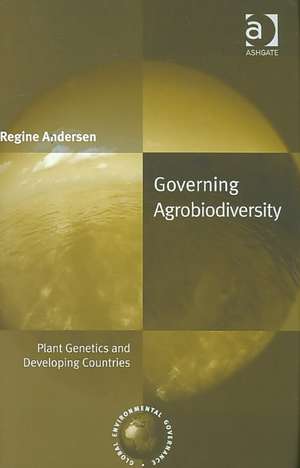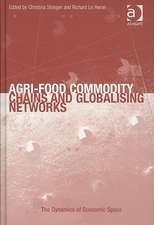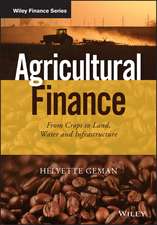Governing Agrobiodiversity: Plant Genetics and Developing Countries: Global Environmental Governance
Autor Regine Andersenen Limba Engleză Hardback – 28 iul 2008
Din seria Global Environmental Governance
- 9%
 Preț: 935.52 lei
Preț: 935.52 lei - 10%
 Preț: 313.89 lei
Preț: 313.89 lei - 12%
 Preț: 312.43 lei
Preț: 312.43 lei - 15%
 Preț: 703.08 lei
Preț: 703.08 lei -
 Preț: 468.79 lei
Preț: 468.79 lei - 25%
 Preț: 769.55 lei
Preț: 769.55 lei - 18%
 Preț: 1002.63 lei
Preț: 1002.63 lei - 5%
 Preț: 1177.16 lei
Preț: 1177.16 lei - 25%
 Preț: 766.66 lei
Preț: 766.66 lei -
 Preț: 449.41 lei
Preț: 449.41 lei -
 Preț: 469.34 lei
Preț: 469.34 lei -
 Preț: 469.34 lei
Preț: 469.34 lei -
 Preț: 469.34 lei
Preț: 469.34 lei - 13%
 Preț: 338.33 lei
Preț: 338.33 lei - 25%
 Preț: 769.72 lei
Preț: 769.72 lei -
 Preț: 469.34 lei
Preț: 469.34 lei -
 Preț: 469.34 lei
Preț: 469.34 lei - 25%
 Preț: 855.89 lei
Preț: 855.89 lei -
 Preț: 382.91 lei
Preț: 382.91 lei -
 Preț: 389.66 lei
Preț: 389.66 lei
Preț: 774.41 lei
Preț vechi: 1033.39 lei
-25% Nou
Puncte Express: 1162
Preț estimativ în valută:
148.20€ • 153.85$ • 123.58£
148.20€ • 153.85$ • 123.58£
Carte tipărită la comandă
Livrare economică 24 martie-07 aprilie
Preluare comenzi: 021 569.72.76
Specificații
ISBN-13: 9780754647416
ISBN-10: 0754647412
Pagini: 442
Dimensiuni: 156 x 234 x 33 mm
Greutate: 1.02 kg
Ediția:1
Editura: Taylor & Francis
Colecția Routledge
Seria Global Environmental Governance
Locul publicării:Oxford, United Kingdom
ISBN-10: 0754647412
Pagini: 442
Dimensiuni: 156 x 234 x 33 mm
Greutate: 1.02 kg
Ediția:1
Editura: Taylor & Francis
Colecția Routledge
Seria Global Environmental Governance
Locul publicării:Oxford, United Kingdom
Recenzii
'...provides a fascinating account of the policy-making process related to agrobiodiversity. The analysis documents how the clash between access regulations, breeders' rights and patent rights has had adverse effects on the management of plant genetic resources in developing countries...makes a valuable contribution to the policy debate on the national and international management of agrobiodiversity.' Jean-Paul Chavas, University of Wisconsin, USA 'The proliferation of overlapping international regimes poses new challenges for international governance. This study provides an extremely useful and timely overview of the complexity and negative aggregate effects of the regime constellation governing agrobiodiversity at the national level. This is a theoretically and empirically rich analysis, with direct policy relevance, which will stimulate much needed research into new forms of international environmental governance.' ' Philippe Le Prestre, Université Laval, Canada
Notă biografică
Regine Andersen is a Senior Research Fellow of The Fridtjof Nansen Institute, Norway.
Cuprins
Part I: Introduction; Chapter 1: Relevance and Objectives of the Study; Chapter 2: Plant Genetic Resources for Food and Agriculture: Foundations of the Topic; Part II: Research Design; Chapter 3: Research Questions and Analytical Framework; Chapter 4: Research Strategy and Methods; Part III: The Constellations of International Regimes Pertaining to Plant Genetic Resources for Food and Agriculture; Chapter 5: The International Treaty on Plant Genetic Resources for Food and Agriculture with the International Undertaking on Plant Genetic Resources; Chapter 6: The Convention on Biological Diversity; Chapter 7: The Agreement on Trade-Related Aspects of Intellectual Property Rights and the Convention for the Protection of New Varieties of Plants; Chapter 8: Regime Overlap, Interaction and Resulting Constellations; Part IV: Domestic Responses to the International Regime Constellation Pertaining to Plant Genetic Resources for Food and Agriculture: Cases from the Philippines; Chapter 9: Effects in the Philippines; Chapter 10: Mechanisms of Influence of International Regimes: Two Cases; Part V: Conclusions, Relevance and Challenges; Chapter 11: The Aggregate Effects of International Regimes on PGRFA Management in Developing Countries; Chapter 12: Implications of the Findings and Challenges Ahead
Descriere
Plant genetic diversity is crucial to the breeding of food crops and is therefore a central precondition for food security. This important book contributes to our understanding of how international regimes affect the management of plant genetic resources for food and agriculture in developing countries.















